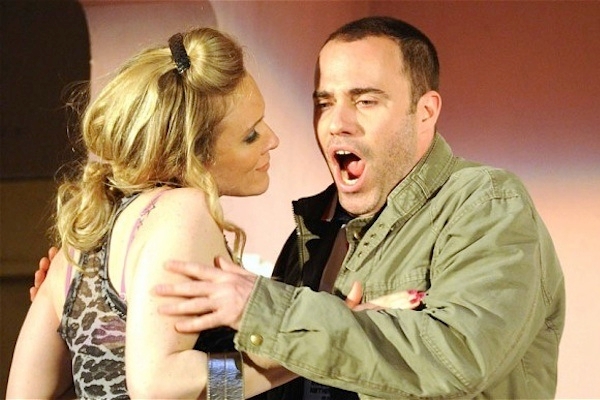At the close of the first night of Wozzeck at the Coliseum there was a longer dead silence than I can remember after any operatic performance I have been to, and when applause began it sounded reluctant. Everyone was stunned by the intensity and involvingness of the preceding 100 minutes, the work having been performed straight through, no interval. Virtually every element in the production contributed to this shattering effect, and any shortcomings would be easily corrigible and with one exception trifling.
Perhaps the first thing to say is that the conducting of Edward Gardner and the playing of the ENO orchestra were at least as fine as any that I have heard in this work, achieving the remarkable feat of observing, as much as any set of performers ever has, Berg’s ‘analytical’ compositional methods, while also just avoiding recklessness in the passion of their commitment to this extraordinary score. Despite their fervour, they never drowned the singers, and almost every word of Richard Stokes’s excellent translation was audible.
That could have been undermined by a stupid production, but Carrie Cracknell, working with the set designer Tom Scutt, avoided the pitfalls that this opera is prone to, and came up with a claustrophobic and serviceable and direct account. The setting is contemporary, somewhere like RAF Brize Norton, with disabled soldiers returning in wheelchairs, dead ones in Union Jack-draped coffins. That could suggest that the weird behaviour of many of the characters is PTSD, but that certainly wasn’t emphasised, and one wouldn’t want it to be. One of the things that makes Wozzeck, the play and the opera, so oppressive is that one can’t profitably look for causes of the characters’ upsetting behaviour, they are just made that way. Nonetheless, giving them so resonant a context does stop us from wasting time on speculation, so we can simply be appalled by the way people treat one another.
The set is on three layers, the second one up being devoted to Marie’s flat, no more cheerful than you might expect. The third is a row of urinals, unemployed throughout — after the production has closed they could usefully be resituated for use at ground-floor level in the Coliseum. Possibly the fact that all the action takes place indoors is unfortunate, since the eeriness of the outdoor scenes as written is powerful; but this is a very non-expressionist production of the work.
The singing actors are of a uniformly impressive standard. Leigh Melrose is the more moving as Wozzeck because he is not merely a bewildered sufferer, and his scenes with Sara Jakubiak, the brilliant Marie, are harrowing partly because one sees she is rejecting an appealing, attractive man for an idiot of a Drum-Major. The ever-experimenting Doctor is played by James Morris, no less; not so demanding a role as his usual Wotan, but played and sung with at least equal conviction. The exasperating Captain is tolerable, just, thanks to Tom Randle’s rich characterisation. The only mistake in casting is Marie’s child, who looks about 11, so that he would clearly understand what was meant by ‘You, your mother is dead’, instead of simply going on playing; since he has already examined the corpses of his parents, Wozzeck having cut his own throat after Marie’s, but in the kitchen with blood running down the walls.
There remains the question, elementary and radical, of the status of this undeniably shattering work. The great orchestral interlude shortly before the end is not cathartic, it is the penultimate thud in the guts, so, in a performance as lacerating as this, one is left in a state of utter misery. We know that life is appalling for almost everyone, has always been and is only likely to get worse. A great artist can remind us of that with terrible vividness, but if we don’t do anything about it — and nothing radical can be done — what is the point of sitting in comfortable pseudo-misery watching people in uncomfortable non-pseudo misery? Someone tell me.
Four evenings earlier I had been to the Royal Opera’s latest revival of Die Zauberflöte in David McVicar’s ever-more subtle and serious production, with this run’s second cast. This, too, was near-perfection, and as exalting as Wozzeck is lowering. In Julia Jones the Royal Opera has a real find of a Mozart conductor, a rare species. The opening chord of the Overture, solid, solemn, carefully weighted, led to a wonderfully detailed account not only of this slightly academic orchestral piece but of the whole sublime masterpiece too. Simon Keenlyside’s Papageno is even more moving than it was, one of the half-dozen or so definitive operatic characterisations I have seen. The new hero and heroine, Andrew Staples and Sophie Bevan, are already admirable as Tamino and Pamina. Albina Shagimuratova makes as intimidating a Queen of the Night as her name suggests, and Matthew Rose, though he needs to work on his lowest notes, is a moving, unusually convincing Sarastro. When you emerge from an opera with as strong a sense of the possibilities of life as this, you are bound to feel not only gratitude, but also the conviction that this is the truest, deepest function of art.






Comments